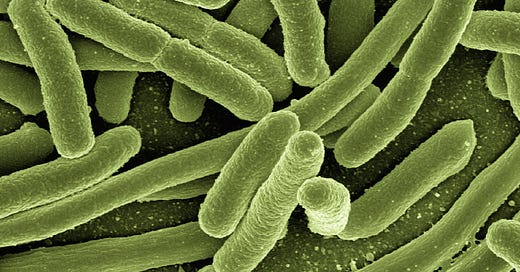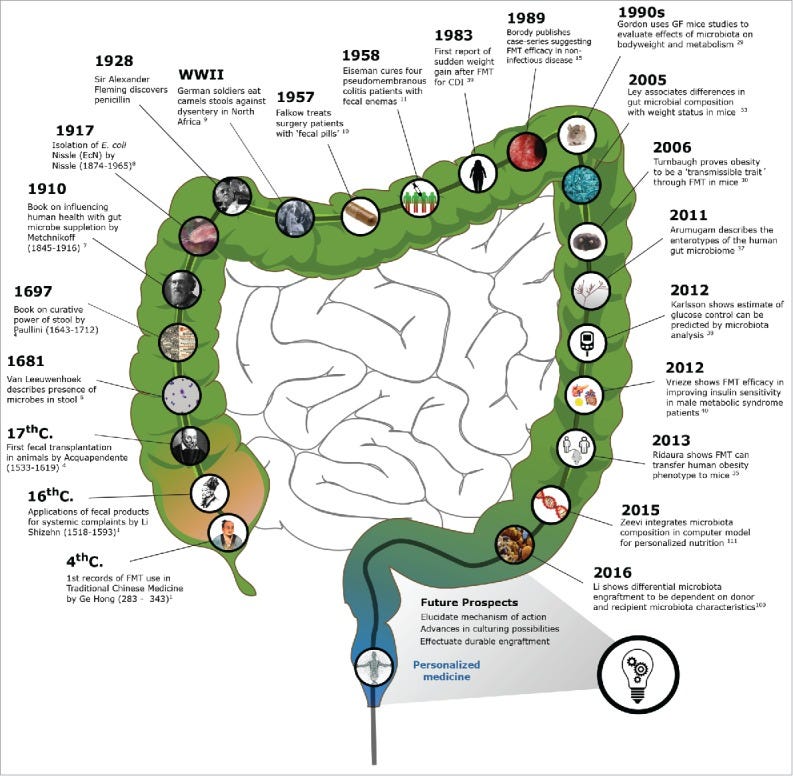How Poop Is Saving Lives: The Research Behind Fecal Transplant
Reboot Your Gut - Explore how this centuries old remedy is treating today’s toughest gut infections & chronic diseases
Fecal Microbiota Transplantation (FMT)
Fecal microbiota transplantation is an ancient therapy for modern medicine: Exploring the science, history and future applications of fecal transplants in treating gut related disorders and chronic diseases.
What is a Fecal Transplant?
Fecal microbiota transplantation (FMT), also known as stool transplant or bacteriotherapy, is a medical procedure involving the transfer of stool from a healthy donor into the gastrointestinal tract of a recipient.
This technique is primarily utilized to treat recurrent Clostridioides difficile (C. difficile or C. diff) infections, particularly in cases where conventional antibiotic treatments have failed.
During the procedure, a stool sample is collected from a thoroughly screened donor, mixed with a sterile saline solution, and then filtered to produce a liquid suspension. This suspension is then administered to the patient via colonoscopy, enema, or a nasogastric tube, depending on the clinical situation.
FMT has shown remarkable effectiveness in treating recurrent C. difficile infections, with success rates exceeding 90%. However, it is generally reserved for patients with persistent or severe infections.
Notably, FMT has been used successfully even in very young patients, including infants as young as 13 months.
Understanding Clostridioides difficile
C. difficile is a spore-forming, gram-positive, anaerobic bacillus that produces toxins capable of causing a range of gastrointestinal symptoms, from mild diarrhea to life-threatening conditions such as pseudomembranous colitis, toxic mega colon, and septic shock.
Infection typically occurs after the use of antibiotics, which disrupt the normal gut microbiota and allow C. difficile to proliferate. The bacterium is highly resilient, with spores that can survive on surfaces for long periods and are easily transmitted through contaminated hands, especially in healthcare settings.
C. difficile is responsible for approximately half a million infections annually in the United States alone, underscoring its significance as a public health concern.
Risk factors for infection include:
Recent or prolonged use of antibiotics or proton pump inhibitors
Immunosuppression
Advanced age
Hospital or nursing home stays
de Groot PF & et al. Fecal microbiota transplantation in metabolic syndrome: History, present and future. Gut Microbes. 2017;8(3):253-267.
Ancient History of FMT
The concept of fecal transplantation is not new. Its roots trace back to ancient China during the 4th century CE, where physicians used preparations like "yellow soup" to treat food poisoning and severe diarrhea. By the 16th century, Chinese medical texts described various fecal-based remedies for gastrointestinal ailments.
Elsewhere, Bedouin communities were known to ingest camel feces to treat dysentery. In Europe, the Italian surgeon Andrea Acquapendente (1537–1619) introduced "transfaunation” is the transfer of gut contents from healthy to ill animals which is an approach that found applications in veterinary medicine.
Further uses of human feces in therapy were documented in the 18th and 19th centuries and even during World War II, when German soldiers suffering from dysentery in North Africa were treated with gut bacteria-based therapies.
Mechanisms of Action: How FMT Works
The primary goal of FMT is to restore a balanced and diverse microbial community in the gut. This is achieved by reintroducing healthy bacteria that:
Regulate immune and inflammatory responses
Normalize neurotransmitter levels
Improve energy metabolism
Enhance gut barrier integrity and reduce intestinal permeability ("leaky gut")
Suppress pro-inflammatory pathways and stimulate beneficial T-cell activity
By replicating the healthy microbiota profile of the donor, FMT helps re-establish gut homeostasis and mitigates disease severity.
Evidence from Clinical Research
Study on Recurrent C. difficile Infection
A pivotal randomized controlled trial assessed the effectiveness of duodenal infusion of donor feces in patients with recurrent C. difficile infection. Patients were assigned to one of three groups:
1. Oral vancomycin + bowel lavage + fecal infusion
2. Standard oral vancomycin
3. Oral vancomycin + bowel lavage
The fecal infusion group showed a 94% success rate after one or two infusions. In contrast, only 31% of the oral vancomycin group and 23% of the vancomycin plus lavage group achieved complete resolution.
The study concluded that FMT is significantly more effective than antibiotic therapy alone in resolving recurrent C. difficile infections.
Additional Research on Metabolic Conditions
In another randomized, double-blind, placebo-controlled cross-over trial, 101 children and adolescents (aged 6–18) with obesity and insulin resistance received probiotic or placebo treatments.
After eight weeks of probiotic therapy and a four-week washout, the probiotic group showed improved insulin sensitivity and glucose metabolism. These findings support the potential role of microbiota-based therapies in metabolic disorders.
Expanding the Therapeutic Scope of FMT
Beyond C. difficile, ongoing research explores the use of FMT in a variety of conditions, including:
Autism spectrum disorder (ASD)
Non-alcoholic fatty liver disease (NAFLD)
Irritable bowel syndrome (IBS)
Inflammatory bowel disease (IBD)
Type 2 diabetes
Functional constipation
While promising, more rigorous clinical trials are necessary to establish safety, efficacy, and optimal protocols for these broader applications.
Side Effects of Fecal Microbiota Transplantation (FMT)
The U.S. Food and Drug Administration (FDA) has issued a public safety communication regarding the potential risk of serious or life-threatening infections associated with fecal microbiota transplantation (FMT).
The FDA reported that six patients developed infections caused by enteropathogenic Escherichia coli (EPEC) and Shigatoxin-producing Escherichia coli (STEC) following FMT procedures using material supplied by a commercial stool bank.
Among these cases, four patients were hospitalized and two patients with underlying chronic health conditions received FMT products from a donor linked to STEC infections and subsequently died.
Conclusion
Fecal microbiota transplantation represents a transformative approach in the treatment of gastrointestinal and systemic conditions associated with dysbiosis. Its proven efficacy in managing recurrent C. difficile infections highlights the therapeutic power of the gut microbiome.
While the concept has ancient origins, modern scientific validation has positioned FMT as a powerful tool in both infectious disease management and potentially a wide array of chronic illnesses. Continued research and regulation are essential to unlocking its full potential across diverse medical conditions.
Other related posts:
The First 100 Days: How Gut Health Shapes Your Baby’s Allergy Future
Breathe Easier: How Your Gut Microbiome Could Be Controlling Your Asthma
Is Your Asthma Medication Hurting You? The Adverse Effects of Corticosteroids
Are Your Teeth Destroying Your Joints?
🔥You Don’t Have to Eat Poop, Join the 21-day Challenge to Reset Your Gut
🚨Join the 21-Day Metabolic & Insulin Reset Challenge - Week 1
🔥Fat Burning, Reboot Your Metabolism, Improve Insulin Sensitivity & Gut Health, Whole Body Reset, Reclaim Your Energy.
✅ What Happens When You join the 21-Day Metabolic & Insulin Reset Challenge
✔ Burn fat more efficiently - even at rest
✔ Support healthy weight loss without extreme dieting
✔ Improve insulin sensitivity and reduce the risk of type 2 diabetes
✔ Reduce risks of metabolic syndrome which contribute to heart diseases, stroke, chronic inflammation & fatigue
✔ Eliminate energy crashes or sugar cravings, improve gut health✔ Enjoy balanced, stable energy and focused throughout your day
But….as a free subscriber, you’re missing out a lot!
When you upgrade your subscription now, you'll get access to
✅ 48-Hour Weight Loss Plan + Weekly Post to Beat Chronic Health Issues and Reclaim Your Health!
✅ Join the ONLY Monthly Health Challenge - Designed to Inspire Action and Deliver Results. This Isn’t Just Another Challenge 💥 This is a LIFESTYLE SHIFT that empowers you to take action, stay consistent, and achieve the health you’ve always wanted. 🌱
✅ Live or recorded Workshops, Webinars, or Podcasts with uncensored, unfiltered & no-nonsense perspectives on health. Deep dive on Immune System Reset, Metabolic Health Reset, Gut Reset, and Brain Reset to reclaim your health.
✅ A 20-min Chat with me, followed by a personalized action plan sent straight to your inbox.
Join The VIP Inner Circle
✅ 48-Hour Weight Loss Plan+ Weekly Tips to Beat Chronic Health Issues and Reclaim Your Health! 🌟
✅ Join the ONLY Monthly Health Challenge - Designed to Inspire Action and Deliver Results -Immune System Reset, Gut Reset, and Brain Reset. This Isn’t Just Another Challenge 💥 This is a LIFESTYLE SHIFT that empowers you to take action, stay consistent, and achieve the health you’ve always wanted. 🌱
✅ Live or recorded Workshops, Webinars, or Podcasts with uncensored, unfiltered & no-nonsense perspectives on health. Deep dive on Immune System Reset, Metabolic Health Reset, Gut Reset, and Brain Reset to reclaim your health.
✅ A 20-min Chat with me, followed by a personalized action plan sent straight to your inbox.
✅ Exclusive Access to The Health Accelerator: A 60-minute 1:1 private coaching call twice a year with me (value $997) + Inner Circle access.
Remember knowledge is power and the more you know, the better decisions you can make for yourself and your loved ones.
If you find this information helpful, please share with your friends and family who may benefit from this information.
Would like to hear your thoughts about this topic:
References:
Kelly CR, Allegretti JR. Review Article: Gastroenterology and Clostridium difficile Infection: Past, Present, and Future. Clin Infect Dis. 5;77(Suppl 6):S463-S470.
Antushevich H. Fecal microbiota transplantation in disease therapy. Clin Chim Acta. 2020;503:90-98.
Shen ZH, Zhu CX, Quan YS, Yang ZY, Wu S, Luo WW, Tan B, Wang XY. Relationship between intestinal microbiota and ulcerative colitis: Mechanisms and clinical application of probiotics and fecal microbiota transplantation. World J Gastroenterol. 2018;24(1):5-14.
Gu X, Chen ZH, Zhang SC. Fecal microbiota transplantation in childhood: past, present, and future. World J Pediatr;19(9):813-822.
van Nood E, Vrieze A, Nieuwdorp M, Fuentes S, Zoetendal EG, de Vos WM, Visser CE, Kuijper EJ, Bartelsman JF, Tijssen JG, Speelman P, Dijkgraaf MG, Keller JJ. Duodenal infusion of donor feces for recurrent Clostridium difficile. N Engl J Med. 2013;368(5):407-15.
de Groot PF, Frissen MN, de Clercq NC, Nieuwdorp M. Fecal microbiota transplantation in metabolic syndrome: History, present and future. Gut Microbes. 2017;8(3):253-267.
Wang J, Xiao Y, Lin K, Song F, Ge T, Zhang T. Pediatric severe pseudomembranous enteritis treated with fecal microbiota transplantation in a 13-month-old infant. Biomed Rep;3(2):173-175.
de Groot PF, Frissen MN, de Clercq NC, Nieuwdorp M. Fecal microbiota transplantation in metabolic syndrome: History, present and future. Gut Microbes. 2017;8(3):253-267.
Barron, M. Fecal Microbiota Transplants (FMT): Past, Present & Future. ASM;2024
Solito A & et al. Supplementation with Bifidobacterium breve BR03 and B632 strains improved insulin sensitivity in children and adolescents with obesity in a cross-over, randomized double-blind placebo-controlled trial. Clin Nutr. 2021;40(7):4585-4594.
These statements have not been evaluated by the Food and Drug Administration (FDA). These products or statements are not meant to diagnose‚ treat or cure any disease or medical condition. Please consult your doctor before starting any lifestyle changes, exercise or nutritional supplement program or before using these or any product especially during pregnancy or if you have serious medical conditions.








I wish I was “sick enough” to have this done. I don't wish C.Diff on myself but I think a fecal transplant could change my health and my life.
As someone who has been morbidly obese my entire life and have some to the last option to lose weight being surgery, I’d love to try FMT to see if that would help restore my gut and ultimately lose weight.